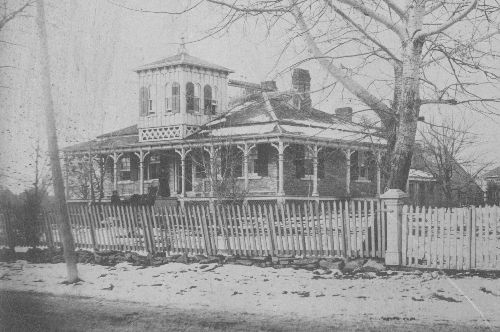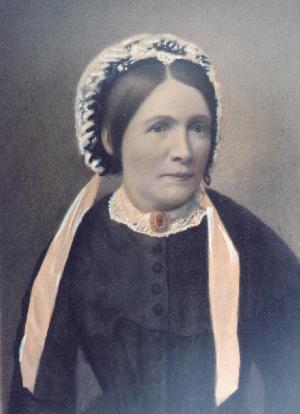
Sidney Cottage, Belleville, early 1900's
A hut in British military usage is a temporary housing for troops; the name Hutto(w)n could thus arise anywhere the need arose for the army. It arose frequently during the time of Cromwell.
A list of my Hutton & Swanwick ancestors was published in "Ancestors and Descendants of Philip Henry" (James Edward Jones, 1925); it was based upon "Descendants of the Rev.Philip Henry" (Sarah Lawrence, 1844), "Life of Rev.Philip Henry" (Matthew Henry), and a biography of Sarah Henry by J.B.Williams. I have not yet attempted to verify its contents in any way.
The life of William Hutton, my 2-greats-grandfather, is published in "Hutton of Hastings" (Gerald E.Boyce, Hastings County Council, 1972). On the title page of the copy he gave to his granddaughter Evelyn, my father wrote:
| William Hutton was my mother's mother's father. He and his wife, Frances McCrea Hutton, pioneered at "Sidney Cottage", the Hutton homestead just west of Belleville Ont., where I lived as a boy. There is a picture of me on page 215, taken the summer I was eight years old, sitting on the verandah. My uncle Willie (William Nisbet Ponton) is standing and my aunt May (May Elizabeth Sankey Ponton) who was both Uncle Willie's wife and my father's sister, is sitting near the hammock. Their youngest daughter Ann (my double first cousin) is standing beside the verandah.... There is a picture of Anna Hutton Ponton, my mother's mother on page 217 and of Mary Swanwick Hutton, your great-great-great-great grandmother on page 80. |  Sidney Cottage, Belleville, early 1900's |
William Hutton was born in Dublin, Ireland, to Rev. Joseph Hutton, a graduate of Trinity College, and minister of a nominally Presbyterian but effectively Unitarian church, and Mary Swanwick (pronounced 'swannik'), the descendant of two well-known English-Presbyterian ministers. Even though William was a sixth son, he received a full gentleman's education in English and the Latin classics. Then, his parents decided that, despite his interest in theology and education, he should become a gentleman farmer. The decision was to cost them dear; for his entire life William required infusions of cash from his parents to support his farms.
He married Frances McCrea, whose family had lived in Ballyheather co.Tyrone for 5 generations. He farmed for ten years in Ireland, at a time when gradually worsening famines made farming increasingly difficult. Finally, in the spring of 1834, he set out for North America. After a tour through New York State, up the Niagara Peninsula, and around to Kingston, he settled on Sidney township, just west of Belleville, and wrote up the particulars of his decision in a letter to his parents, to convince them to advance funds to purchase a farm. (The letter was published in the British Farmers' Magazine.) He also asked his wife to pack up everything and come with their five children to join him.
His wife Fanny was in poor health, her mother Anne was dying and asking to see her grandchildren, and a neighbouring family, intending emigrants, had returned after only four months with miserable accounts of Upper Canada. A number of such accounts survive; one John McDonald of Glasgow described his as
a faithful and impartial account of the hardships through which our unhappy and deluded countrymen are doomed to pass, the privations they must undergo, the sufferings they must endure, with the deplorable consequences resulting from these, before they can be settled in their cold, comfortless, and solitary log-house.
Compared to my Woolley & Neil ancestors, William's family had a luxurious passage. Regular packets averaged only 30 days for the eastward passage to New York, and the food of cabin passengers rivalled that of the best hotels of the time, complete to fresh milk from on-board cows and eggs from well-stocked chicken pens. And, the death rate from disease was a tenth the rate of the ships arriving at Quebec City, thanks to American regulations on steerage accommodations. Even so, Fanny arrived at New York in September with two of the children near death from typhus contracted during the voyage. William took the three healthy children back to Belleville, leaving her with the two sick ones, to follow when they were recovered, and immediately took up school teaching to keep food on the table until his farm should be productive. A letter of this time perhaps explains his wife's and his family's loyalty to him:
I value cheerfulness as a pearl of great price, and if it were not for it I know not what would have become of me. My children, I hope, have taken the spirit from their Father. They are entirely happy and I have not seen Fanny so much for years.
He was not so persuasive with the local Presbyterian ministers, his Irish version of Presbyterianism being considered no less than heretical. He did, however, pick the winning side in the Rebellion of 1837-8, becoming a captain in the 4th Hastings Regiment, and founded a local agricultural society. Perhaps that helped him win his first public post, that of justice of the peace. Then, through the influence of a cousin, Sir Francis Hincks, a member of the Legislative Assembly of United Canada, he was appointed warden (equivalent to mayor) of the Victoria District (the Hastings County of today). Soon, my great-grandmother Anna was governess of the four Hinck's children in Kingston; later, she accompanied them to Montreal for advanced schooling for them and for herself.
William later became County Superintendent of Schools, responsible for issuing certificates of competency to would-be teachers. One left a remarkable record of what one had to do to obtain such a certificate from him:
I found him ploughing on his farm ... he proposed to examine me en route to the House, ploughing as he went ... and he asked me to state what part of speech were each of the nine (sic) 'thats' which were in the following sentence:- "The lady said in speaking of the word that that that that that that gentleman parsed was not that that she requested him to analyze" ...
William's strongly held view that education was the key to equal opportunity for all was implemented throughout the County even when this was to the disadvantage of the town of Belleville on which he depended for political support, even, on one occasion, when it meant defying the law that refused government support to schools in areas too poor to pay school taxes. His philosophy was soon given province-wide visibility in the reports of the Rev. Egerton Ryerson, assistant superintendent of schools for Canada West. But, his lack of consideration for political realities led to his losing the job in 1851. And, his identification with Sir Francis had become a liability. As the Belleville Intelligencer put it upon Sir Francis' later appointment as Finance Minister:
Not merely in Ontario, where, with two or three exceptions, the press of all shades have spoken with the heartiest condemnation of the appointment, but in Quebec, New Brunswick, and even in Nova Scotia, the return of Sir Francis Hincks to political life in Canada is looked upon with particular dread and horror.
William's letter of 7 September 1851 to his mother included news of the first wedding among his
children:
Anna is happily engaged to a very worthy, excellent young man, a Mr. James Ponton, third son of the late Dr. Mungo Ponton, who died near Belleville about two years ago ... his brother William is Mayor of Belleville and all are of good standing ... his mother, who is still alive but residing about 30 miles from this, is a truly excellent old lady, a perfect gentlewoman of the old school. In 1855, William was appointed secretary (deputy minister) of agriculture and statistics and henceforth had to move with the seat of government, which alternated then between Toronto, Kingston and Quebec. His son Joseph, who had graduated as a lawyer and was practising in Belleville, took over Sidney Cottage. After Joseph's sudden death two years later, the homestead was occupied by tenants until William's death in 1861, when his widow returned to live there until her death in 1873. Shortly after that, Anna and James Ponton made it their home, and their son William Ponton after them. In 1905, after the death of his mother, my father was taken there to be brought up by his aunt Grace. After the 2nd William's death, his widow moved to an old folks' home and sold Sydney Cottage. The local historical society moved to have the house declared a historical site, and the new owners panicked. The house, including it's foundations, was razed to a level field within 24 hours. All that remains are the photos taken of the house by the society. |
 Anna Hutton |
Sankey of Ottawa 1991
Ancestral Names
other notes on family history